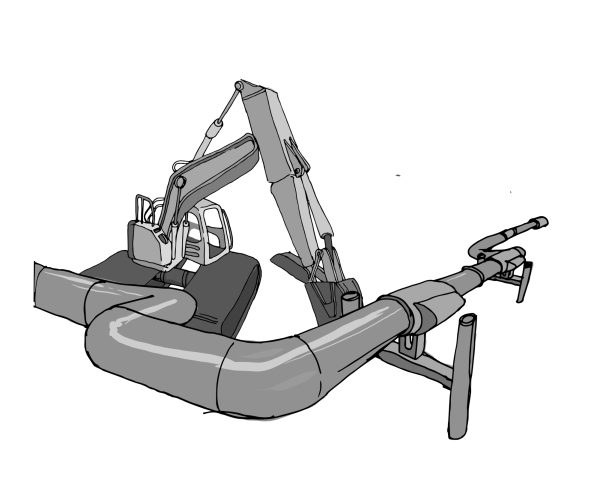Matthew Kahn addresses the business side of climate change
November 4, 2021
Last Wednesday Matthew Kahn, Provost Professor of Economics at USC gave a zoom lecture called “Adapting to Climate Change: Markets and the Management of an Uncertain Future” wherein he proposed his ideas about “Free Market Environmentalism” (commonly known as Ecological Modernization) and “adapting” to climate crises without compromising on the economy.
The presentation loosely followed his book of the same title. Both conclude that human capital fuels adaptation and innovation. The theory is that with scarcity of resources, prices will rise, leading to global innovation under a free market. He submits that this holds true on both individual decisions—the individual will do what is most beneficial to them monetarily—and on the societal scale—society will adapt to natural disasters and scarcity with innovation spawned out of the competitive nature of capitalism.
When asserting that individuals will do what is the most monetarily beneficial, he made the following case in his book and presentation:
“If homeowners anticipate that they will be bailed out by the federal government if a low-probability terrible event occurs, then this diminishes their incentives to take a variety of precautions. If these individuals knew that they had no access to this safety net, they would either be less likely to live in risky areas or build their homes using more resilient materials.”
Kahn’s argument is that people should adapt to the effects of climate change themselves, and that without governmental safety nets in place, they would have to. Those who could not afford to adapt would be forced to leave. The outcome of this proposal would further neighborhood segregation of class and race, as those who are not able to afford renovations to their homes and fire insurance would be forced to move.
Despite not explicitly stating it, when Kahn says “risky areas” he is referring to predominantly black neighborhoods. While most people will encounter the effects of climate change in their lifetimes (according to the Washington Post, “85% of the global population lives in areas affected by human-induced climate change”), he states in his book that “differential exposure to pollution and weather between rich people and poor people and among different racial groups. Black people, on average, are exposed to more air pollution and toxic chemicals than white people.” According to a PSCI report titled “Racial Disparities and Climate Change”, people of color are 75% more likely than white people to live in a community directly affected by toxic facilities. Well-off white communities are not risky areas by comparison.
Furthermore, Khan’s claim, that individuals without a safety net would be less likely to live in risky areas, fails to recognize that reinvestment initiatives after a natural disaster largely go to white communities. As a result, these communities see an increase in average wealth, while minority communities see a decrease in average wealth and substantially lower levels of reinvestment, according to the same PSCI report. People of color do not have the same safety net.
In his presentation, he ultimately submitted that housing vouchers replace disaster compensation from FEMA. He also states in his book “A fair way to reduce such disparities in risk exposure between the rich and the poor is to build more housing in relatively safer places.”
First-year Owen Jakel critiqued this claim. “Giving poor people housing vouchers to move to neighborhoods that won’t cause environmental disaster is a weak solution to a problem. It neglects the fact that poor people and people of color are purposely put in places that will easily flood, have poor air, or water quality,” Jakel said.
Jakel is right, according to a study found and cited in Kahn’s book’s bibliography, Environmental Justice by Banzhaf, Ma and Timmins. There is a causal relationship between race and pollution, the notion that people of color would be safer in a different community is contingent on the resident demographic of said community—it is likely that moving to another predominantly black neighborhood will not make them any safer. Even if more houses are built in areas distant from toxic facilities, it is not historically accurate to suggest that black individuals would be able to move there.
Despite Kahn advocating many times for the lower class, Jakel was frustrated. “He claimed to be a people-first environmentalist and a people-first economist,” yet seemed to neglect the realities of the poor. Kahn did not mention how their economic status may prevent them from taking on the greater responsibilities he proposed (such as moving or renovating their homes).
In the name of protecting the poor and their purchasing power, Kahn called for adapting to the climate crisis in the most economically efficient way possible. It is unclear if this means waiting until climate change worsens to the point where any innovation is more fiscally responsible than none, or getting ahead of the crisis by focusing on competitive renewable energy.
“The demand for energy in the developing world is huge, and coal and natural gas offer reliable service,” Kahn said, later explaining that de-carbonisation is only a priority if the economy doesn’t have to suffer the consequences of going renewable.
When expanding on the idea of competitive innovation, Tesla cars and air conditioners are repeatedly used as examples. Jakel pushed back on this argument as well.
“Free market environmentalism may create new solar panels, but at what cost? Will a monster company that exploits workers be created in the process?” Jakel said. “I think if we’re going to focus on adaptation to climate change, which is the wrong approach in my opinion, I think we need to be a bit more expansive than his vision. How can we completely revolutionize the way we farm, in order to adapt to droughts, long winters, etc. That’s just one example. I think it’s bigger than air conditioners…The fact is that revolutionizing systems isn’t capitalist at all.”
The idea of “Adapting to Climate Change” is an underdeveloped concept when renewable energy, revolutionizing industries to accommodate for natural disasters, protecting lives and intersectionality are all largely excluded from the conversation:
Jakel brings up that focusing solely on competitive adaptations rather than competitive solutions doesn’t address the main problem with climate change, stating that “moving people away from floods won’t stop them from happening.”
He then highlights some key things that Kahn missed in his presentation, “the problem is rooted in the intersection between race, class, environment, and a range of other issues.”
For context, Kahn’s presentation and book lacked acknowledgement of intersectionality and the role that race plays in this, the word “black” making one appearance in his entire book, and the word “indigenous” being completely absent.
This lack of acknowledgement, plus the use of some uncomfortable phrases like “ghettoized” contributed to Jakel’s uneasy feeling, “Honestly, a lot of what stood out to me were the racist, classist and privileged microaggressions.”
Kahn has since been called back by Whitman to present to other economics classes this week, and his book, published by Yale University, is rated among the top ten books in business and economics this spring.
It is absolutely crucial that the narrative around climate change remain inclusive, especially when we are talking about individual action. A lot of Kahn’s book and presentation revolved around the disparities between the upper and lower classes, but it was missing key data surrounding intersectionality. Regardless of how left-leaning or conservative your approach to environmentalism is, climate change affects BIPOC, the Latinx community and people of lower economic standing disproportionately, so including their experiences is necessary and invaluable to coming up with relevant, impactful solutions.









